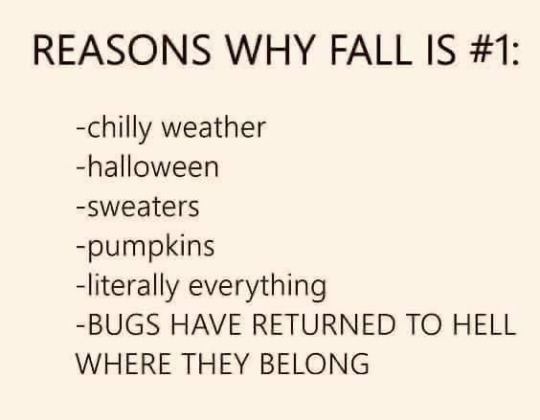#mosquitoes
Text
The love for nature leaving my body after spotting one (1) mosquito

6K notes
·
View notes
Text
Uncharismatic Fact of the Day
As tasty as we humans might seem to some species of mosquito, there are many other species that simply aren't interested in us! For example, the mosquito Uranotaenia sapphirina much rather prefers the taste of worms and leeches, and can be found using their long proboscises to probe the ground for a potential meal.

(Image: Female Uranotaenia sapphirina feeding on earthworms by Dr. Lawrence Reeves)
If you like what I do, consider leaving a tip or buying me a kofi!
792 notes
·
View notes
Text
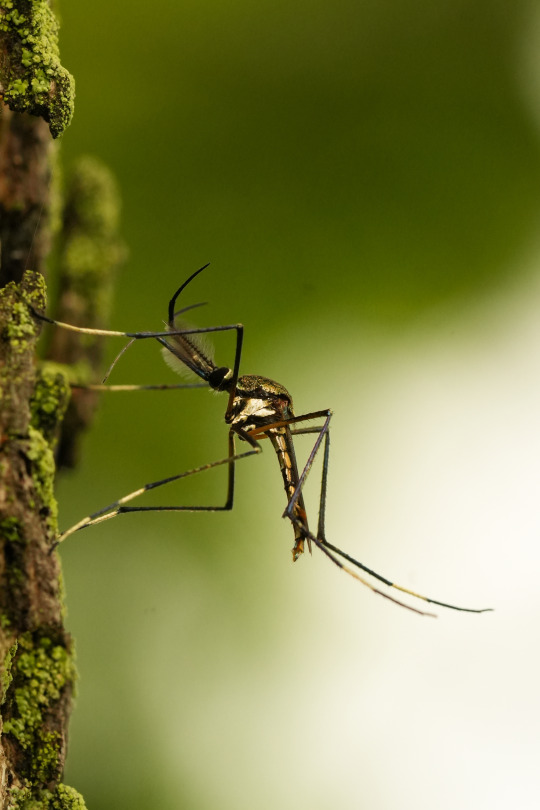
a beautiful male Elephant Mosquito (genus Toxorhynchites), a group of very large mosquitoes that do not consume blood as adults (feeding instead on plant saps, juices, etc.), and who's larvae prey on those of other mosquito species!
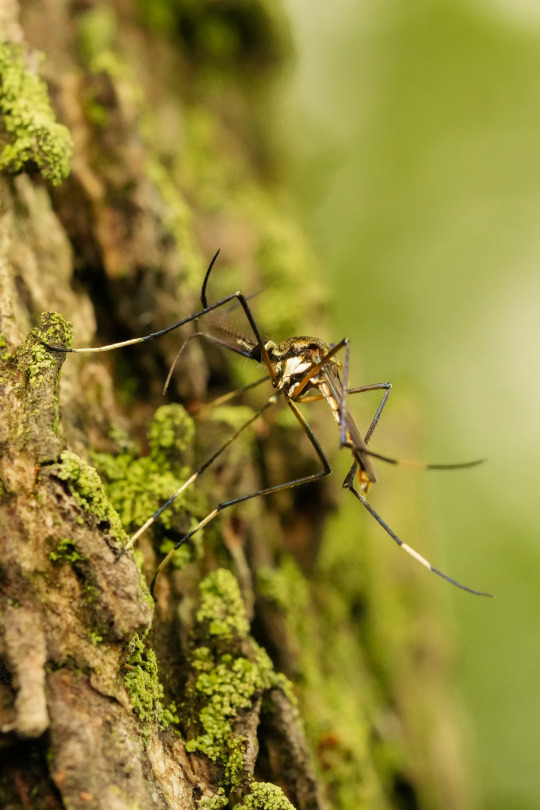
this guy was wonderful to photograph on account of his lovely colouration, and being such a relatively large insect (at least 1cm body length, from memory) I could capture all his details.
Unknown Elephant Mosquito, male (genus Toxorhynchites).
#ljsbugblog#bugblr#entomology#macro#insects#diptera#flies#culicidae#mosquitoes#toxorhynchites#elephant mosquitoes#unconfirmed ID
282 notes
·
View notes
Note
Just read your plastic bug review ( absolutely delightful!) and Id love to hear your mosquito hot takes if you have the time.
Well there's a viral lie that they're ecologically valueless and of course, no, there's really no such thing, and their importance goes far beyond just another food for insect-eaters, but that's more "scientific facts" than "hot takes" so as far as "hot takes" go:
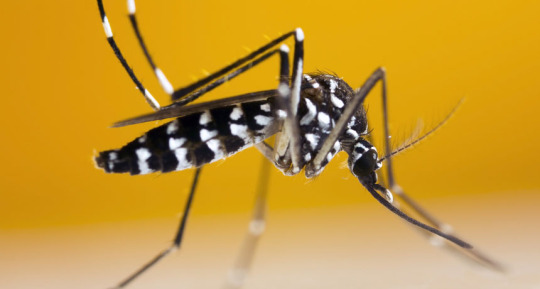
They're both beautiful and cute animals, more charming than butterflies.
The fact that they're bothersome vampires is part of the charm, it's just plain cool that our planet has swarms of night-flying blood-sucking swamp creatures.
I completely reject their status as "deadliest animal" on the basis that a mosquito by itself is irritating but inherently harmless. The diseases they can carry are distinct organisms that evolved to exploit the mosquito as a vehicle. It is worth noting that only a few mosquito species can even transmit illnesses to humans at all!
Speaking of which I notice people are quick to defend bats, raccoons, rats and other more popular animals that can spread disease, but use mosquito borne illness as justification to want mosquitoes totally eradicated, and I think that's pretty transparently a matter of petty spite. Take away the diseases and the mosquito is still an "inconvenience," however harmless, and humans just have a very difficult time with the reality that nature does not exist for our comfort and fun.
Can't help noticing that research into just killing them all off gets more attention and funding than the equally viable and environmentally safer research into simply making them inhospitable to pathogens, and I'm sure that's driven partially by the above biases, but partially because there's probably money and clout in being the one to reduce Pesky Bugs from popular tourist destinations like Florida.
Even having said all of the above, an animal never needs to be harmless, pleasant, or ecologically "essential" to be worthy of admiration. Each is a unique and special sculpture of evolution and a "character" in the vast varied cast of living organisms. Some of them are allowed to be bad guys. Some of them are allowed to just be background filler. The total sum of the different forms taken by life on our planet is what's precious about life on our planet, including every part of it anyone has ever feared or hated.
wiggleys:

912 notes
·
View notes
Text
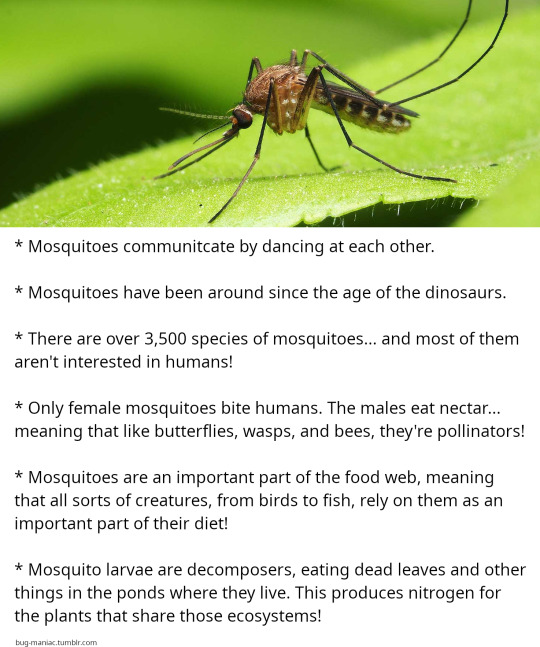
Someone on Reddit wanted one for mosquitoes!
[ID: Image is a female mosquito on a bright green leaf. There is text below it.
Mosquitoes communitcate by dancing at each other.
Mosquitoes have been around since the age of the dinosaurs.
There are over 3,500 species of mosquitoes… and most of them aren't interested in humans!
Only female mosquitoes bite humans. The males eat nectar… meaning that like butterflies, wasps, and bees, they're pollinators!
Mosquitoes are an important part of the food web, meaning that all sorts of creatures, from birds to fish, rely on them as an important part of their diet!
Mosquito larvae are decomposers, eating dead leaves and other things in the ponds where they live. This produces nitrogen for the plants that share those ecosystems!
Small text at the very bottom reads bug-maniac.tumblr.com
/End ID]
741 notes
·
View notes
Text
Researchers reporting in the journal Current Biology on December 4 have found the earliest-known fossil mosquito in Lower Cretaceous amber from Lebanon. What's more, the well-preserved insects are two males of the same species with piercing mouthparts, suggesting they likely sucked blood. That's noteworthy because, among modern-day mosquitoes, only females are hematophagous, meaning that they use piercing mouthparts to feed on the blood of people and other animals.
"Lebanese amber is, to date, the oldest amber with intensive biological inclusions, and it is a very important material as its formation is contemporaneous with the appearance and beginning of radiation of flowering plants, with all what follows of co-evolution between pollinators and flowering plants," says Dany Azar of the Nanjing Institute of Geology and Paleontology at the Chinese Academy of Sciences and the Lebanese University.
"Molecular dating suggested that the family Culicidae arose during the Jurassic, but previously the oldest record was mid-Cretaceous," says André Nel of the National Museum of Natural History of Paris (Muséum National d'Histoire Naturelle de Paris). "Here we have one from the early Cretaceous, about 30 million years before."
The Culicidae family of arthropods includes more than 3,000 species of mosquitoes. The new findings suggest that male mosquitoes in the past fed on blood as well, according to the researchers. They also help to narrow the "ghost-lineage gap" for mosquitoes, they say.
Continue Reading.
184 notes
·
View notes
Text
What Are Mosquitoes Good For?
Originally posted at my blog at https://rebeccalexa.com/what-are-mosquitoes-good-for/
Now that the weather has cooled down over much of the United States, insects have died back or gone into hibernation for the winter. So you may be tempted to be glad that the mosquitoes have disappeared for the time being. Maybe you even wish they wouldn’t come back next year! After all, they’re just mosquitoes, which annoy us and spread diseases, right? What are mosquitoes good for, anyway?
Much to the surprise of a lot of people, they actually have some pretty important ecological functions, and your local ecosystem would likely suffer if the mosquitoes were all exterminated. So today, I am going to be a mosquito apologist.
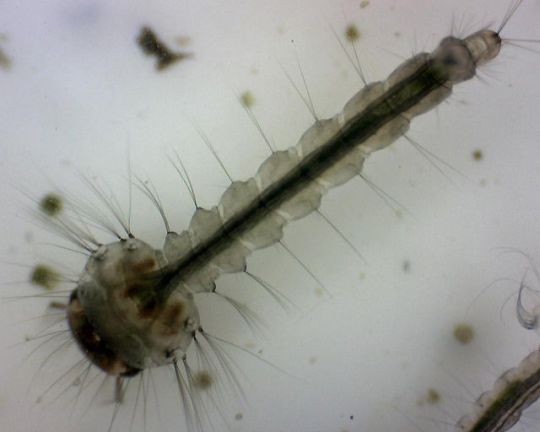
What Are Mosquitoes Good For? Food!
You may have seen hundreds or even thousands of mosquito larvae swimming in a pond or other fresh water. Perhaps you thought every single one of them came to find you after they became adults! They certainly are prolific; some species can lay as many as 300 eggs at once.
But this isn’t just because they want to have more young to annoy you, generation after generation. Rather, it’s because a lot of mosquitoes end up eaten before they even get a chance to reproduce. As eggs and larvae, they’re food for fish, amphibians, and aquatic insects and other arthropods. Once they take to the wing, birds and bats become major predators, as do adult dragonflies and other winged insects, plus spiders that catch them in their webs. While a single bat might not actually eat 1000 mosquitoes in a night, all those various predators do take a significant chunk out of the mosquito population.
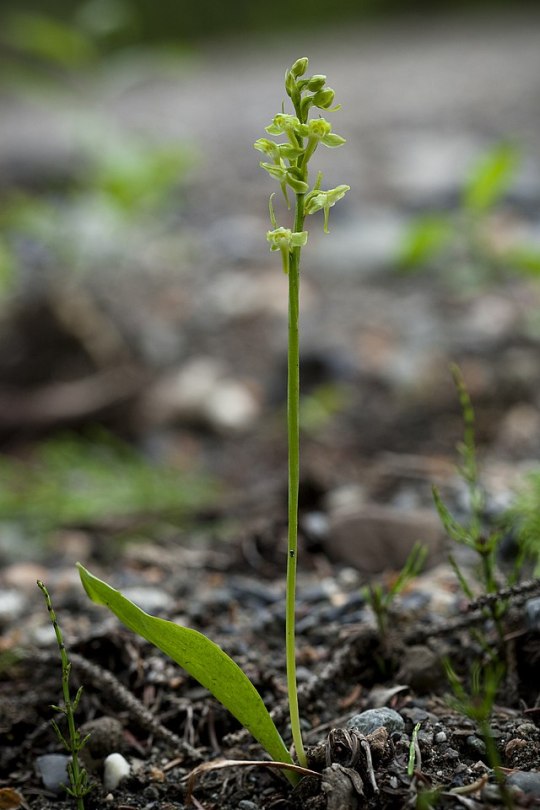
Platanthera obtusata is just one of many orchids that rely on mosquitoes for pollination.
What Are Mosquitoes Good For? Pollination!
Believe it or not, most mosquitoes aren’t out for your blood! The majority of mosquito species are entirely vegetarian; it’s only a few in which the females seek out blood to help produce eggs. Most mosquitoes drink nectar or plant sap, and in the pursuit of the former they play a vital role in pollinating the flowers they visit. Goldenrod and orchids are just two examples of groups of plants pollinated by mosquitoes. And while mosquitoes might drive Alaskans buggy, they are vital for pollination during the short Arctic summer.
What Are Mosquitoes Good For? Keeping Things in Check!
Mosquito larvae spend anywhere from a few days to a few weeks in the water where they hatched. They feed on a variety of bacteria, algae, and other microorganisms. Because they have a lot of growing to do, and need to prepare for their final molt to adult form, they have to eat a lot! That means they help keep their prey species’ populations in check. An overgrowth of algae, for example, can reduce the amount of sunlight that submerged plants have access to, and as the algae dies it increases the amount of nitrogen in the water. By constantly grazing on algae, mosquito larvae are helping to prevent these sorts of ecological imbalances.
What If We Made Mosquitoes Go Extinct?
So what are mosquitoes good for? Quite a lot, apparently! However, there’s no denying some species have also caused us a lot of grief. There have been calls to exterminate all mosquitoes, or at least every species that could ostensibly cause us problems through disease transmission. And to be sure, I don’t want to see people dying of malaria or West Nile virus, especially as these diseases often hit disadvantaged populations harder, with fewer resources for treatment. But it’s something where we need to weigh the consequences carefully.
What would happen if there were suddenly no more mosquitoes? Sure, the animals that prey on them could potentially find other sorts of food, but there would be an upset in the food web as the predators put more pressure on remaining prey species, which could lead to some of those species become locally endangered or even extirpated. Or the predators might drop in number as they failed to find enough food. Either way, getting rid of all the mosquitoes would have a negative impact on the food web.
Finally, and possibly most importantly–we may not fully understand the ecological roles mosquitoes have. As I wrote recently, ecosystems are incredibly complex networks of relationships among thousands of species, and for centuries we have been eradicating entire species without any thought as to what long-term effects their loss might have on their native ecosystems.
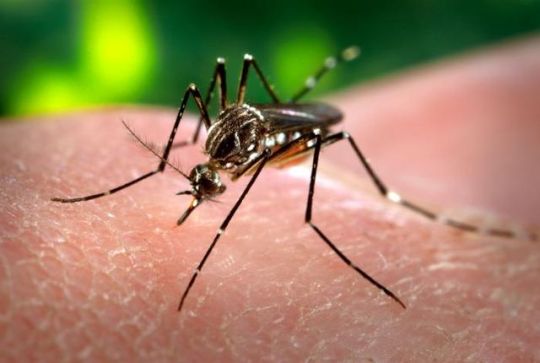
However, that brings up another point: the fact that there are invasive mosquitoes. Invasive species wreak havoc on ecosystems they’re introduced to, and it just so happens that one of the most notorious disease-spreading mosquitoes, Aedes aegypti, is invasive across much of the tropics, as well as subtropical and temperate areas worldwide. Spread through the slave trade, this mosquito is a prime vector for yellow fever, dengue fever, Zika, and several other pathogenic diseases affecting humans. Its cousin, Aedes albopictus, is also a disease vector and is more cold-hardy, meaning it could spread even further.
What’s the answer? Well, historically people just drained wetlands, much to the devastation of the native ecosystems there. More recently, the widespread and indiscriminate use of pesticides like DDT also knocked back mosquito populations (at least temporarily), but also killed off many other animals both directly and indirectly, to include nearly wiping out multiple raptor species due to eggshell thinning. Moreover, mosquitoes have developed resistance to pesticides, making them a less useful tool overall.
More recent innovations to control specific invasive mosquitoes hold some promise. A. aegypti, for example, has been genetically modified in labs to create a strain known as OX513A. Not only do the offspring die before they can reproduce, even if a OX513A breeds with a wild mosquito, but the offspring also apparently lack resistance to some pesticides. Biological control using Wolbachia bacteria inhibits A. aegypti‘s reproduction, and also makes them unable to carry certain diseases such as Zika and dengue fever.
So it would appear that the fight to control invasive species also has the bonus effect of stopping the mosquitoes most likely to give the rest a bad name.
Did you enjoy this post? Consider taking one of my online foraging and natural history classes, checking out my other articles, or picking up a paperback or ebook I’ve written! You can even buy me a coffee here!
#mosquito#mosquitoes#insects#invertebrates#arthropods#wildlife#wild animals#animals#entomology#biology#ecology#invasive species#nature#natural history#bugs#long post#environment#environmentalism#conservation
822 notes
·
View notes
Text

so curly 🖤
153 notes
·
View notes
Text




294 notes
·
View notes
Text
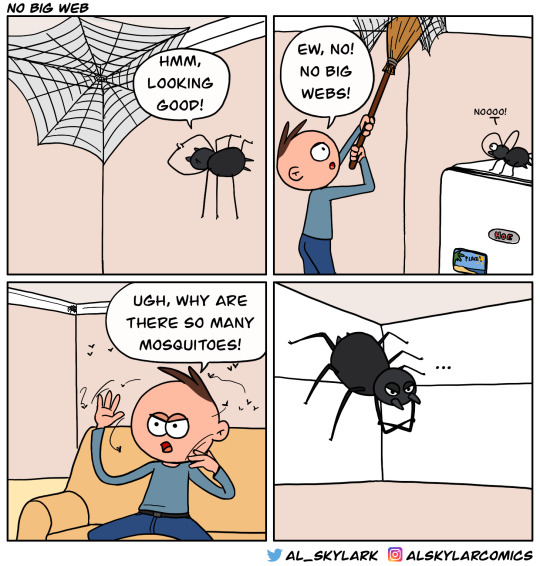
Gee, I wonder what would've HELPED! 😤🕷️
346 notes
·
View notes
Text
It is October.
How
And I ask again HOW
ARE THE MOSQUITOES STILL ALIVE AND KICKING?? THIS IS DENMARK FOR CHRIST'S SAKE THEY'RE SUPPOSED TO BE DEAD BY NOW!
81 notes
·
View notes
Text
Uncharismatic Fact of the Day
Just like baby cats are kittens and baby dogs are puppies, baby mosquitoes are wrigglers! Mosquito larvae are aquatic, and spend most of their time wriggling through the water, hence the term ‘wriggler’. Likewise, mosquito pupae are called tumblers for the way they tumble near the water’s surface.
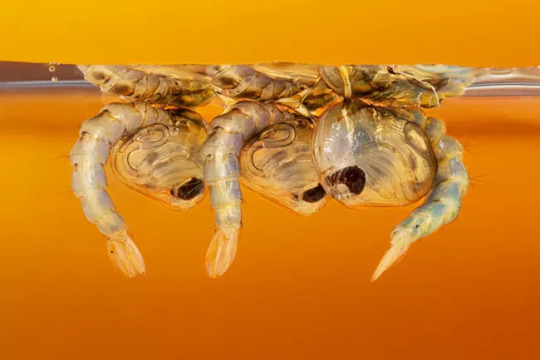
(Image: Southern house mosquito pupae, or tumblers (Culex quinquefasciatus) by James Gathany)
If you like what I do, consider leaving a tip or buying me a ko-fi!
308 notes
·
View notes
Text
Alright entomology side of tumblr, I would like to be proven wrong today:
Are mosquitoes useful besides being ecosystem fodder, or are they
Horrible Creatures 👉 🦟
#bugs#mosquitoes#tw bugs#bugblr#entomology#genuinely curious tbh I’ve hated them all my life but are they actually good for something or do they suck#if I’m right and they do Suck then I’m gonna keep yelling at them for keeping me up countless hours in the night this summer
87 notes
·
View notes
Text
That native animal in your ecosystem that you hate or find annoying or scary is more fundamental to the long term health of that ecosystem than you are.
Yes, even that one.
42 notes
·
View notes
Photo
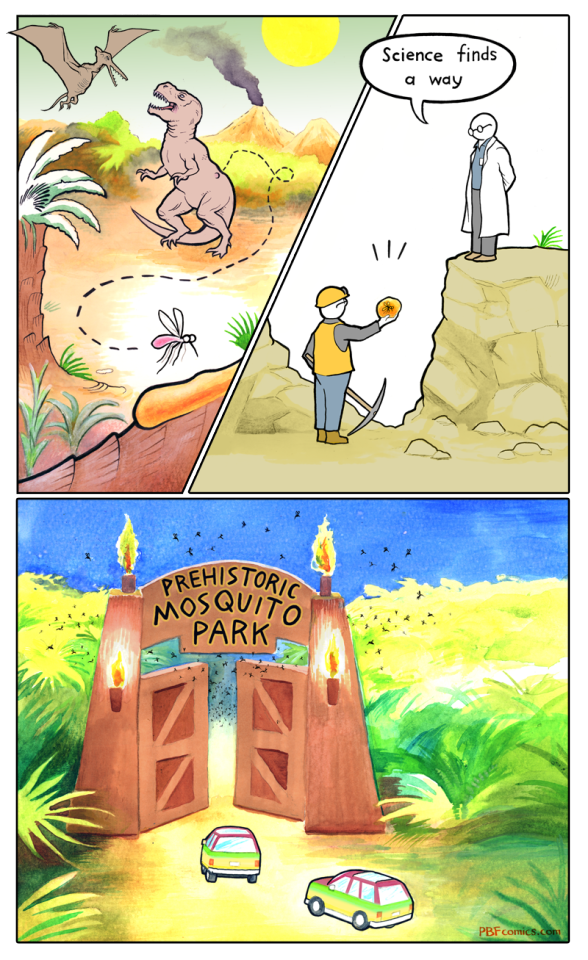
15 notes
·
View notes
